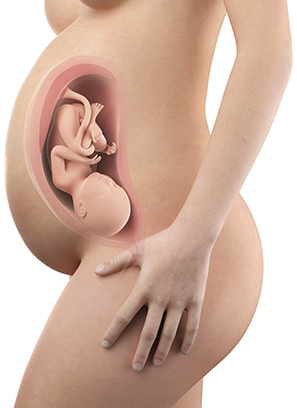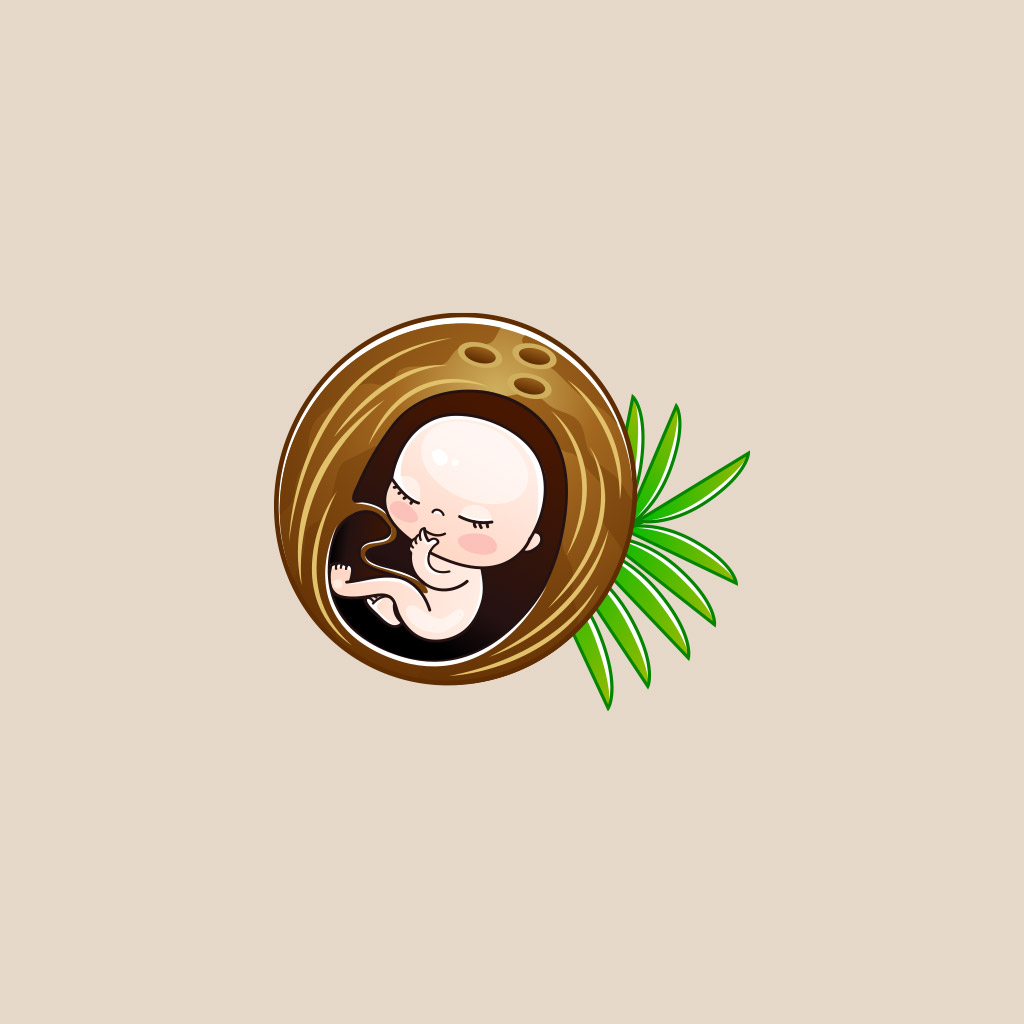Welcome to week thirty four!
You may not feel the same type of fetal movement that you did earlier in the pregnancy.
Your baby should still move as often but no longer has the room to make huge somersault type movements. If your baby was born now, he/she would be considered late preterm and would probably only need minimal support from a special care nursery. You are probably getting increasingly excited about the upcoming event and looking forward to meeting your baby!

You may not feel the same type of fetal movement that you did earlier in the pregnancy.
How my Baby Grows
- Your baby is about the size of a large cantaloupe
- He/she is swallowing up to a liter of amniotic fluid each day and passing the same amount of urine
- Your baby is starting to see colors
- Tiny nails have fully developed and are getting longer
- The central nervous system in your baby is developed now and the brain has become increasingly more wrinkled which is a good thing making your baby smarter
- Your baby’s lungs are still developing and growing, and he/she is practicing for his/her first breathe by breathing amniotic fluid in and out
- The greatest amount of amniotic fluid is at 34 weeks
Symptoms Mama may Feel or Experience
- As you get closer to your due date there are a few warning signs that your doctor or midwife will be assessing you for
- A fairly common complication of pregnancy is called pre-eclampsia or pregnancy induced hypertension (PIH), symptoms for this are a severe headache that does not go away with Acetaminophen, increased fluid in your hands/feet/face, pain in the upper abdomen and changes in your vision like seeing spots or blurred vision
- These findings will often be associated with a significant rise in your blood pressure and changes in certain laboratory findings
- Not all women have the same symptoms so your provider will be looking at the whole picture of symptoms and labs to plan your care
- The sciatica we talked about a couple of weeks ago that sends shooting pain down your lower back, buttocks and legs may be getting a little worse and so is the pelvic pain and pressure you have been feeling
- Your baby’s movements are a sign that he/she is doing well so your doctor or midwife will be asking you about that and encouraging you to continue performing those fetal movement counts-remember that 10 movements of any type other than hiccups in any 2-hour period of the day is reassuring
- Your baby is still having sleep cycles, and these are often during the day as you walk around rocking them to sleep with each step you take
- You may be feeling more Braxton Hicks contractions which are irregular and space out with rest and hydration
- Work is probably becoming more difficult due to a return of some fatigue and it is important to rest when you first get home, let someone else get dinner started if that is an option
- If you are a gestational diabetic your doctor or midwife is looking over your diabetic log, it is difficult to keep checking your blood sugars and monitoring everything you eat but it is so very important to reduce complications to your birth and your baby, good job mom
Thoughts to Consider
- Have you received the breast pump from your insurance company yet, if so get it out and practice setting it up, you can also bring it with you to the hospital or birth center and get help using it the first couple of times
- Don’t get overwhelmed when you first unpack all the parts and pieces
- You will be a pro before long
- Continue practicing your breathing techniques each night before bed as you will be more comfortable with them and they will be more effective in controlling pain if you have practiced them
- If you are having a lot of trouble sleeping and have tried the suggestions in our StorkAdvisor article on sleep, consider sleeping in a recliner if you have one and it is comfortable
- You may be worried about hurting your baby if you have sex now, but as long as it is something that you want, you have not been instructed by your doctor or midwife to refrain, you are not bleeding or leaking fluid it is still safe and can still be enjoyable if you keep a few things in mind
- Your vagina may be swollen so it might not feel the same
- You may have to try different positions for comfort
- In order to decrease your risk for tearing at the time of birth you can begin perineal stretching exercises each night with a lubricant
Tips for a Healthy Pregnancy
- Staying active without exhausting yourself will help you feel better throughout the pregnancy, especially now near the end
- Walking in the evenings is a great way to do that with a buddy to just talk and laugh
- Yoga, relaxation exercises, or swimming are also great at this time in your pregnancy
- Limit any stressors that you can, if you are unable to do all of the things that you did prior to the pregnancy because of fatigue or other reasons, give yourself the grace to focus on the pregnancy and your baby, most things can wait or even better allow others to help
- Water is still important so continue getting that 64-80 ounces a day, maybe that is becoming easier for you now

Dr. Cheryl Sharp,
Certified Nurse Midwife
Chief Content Officer
Chief Content Officer


